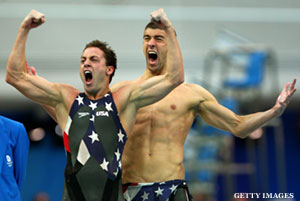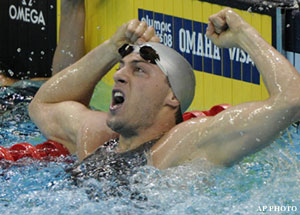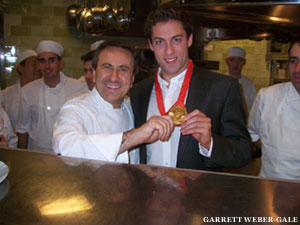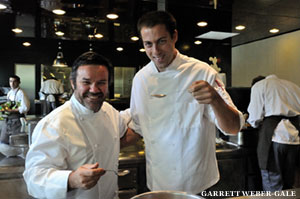This isn’t just any rice.
The 360 guests at the La Paulée Gala Dinner in New York already know that.
It’s laced with chives and minced black truffles. And there’s an extra tray of it just sitting off to the side of the kitchen, next to a sauce made from an intense chicken stock and emulsified with foie gras.
One wouldn’t expect anything less from a team of culinary all-stars like Daniel Boulud, Michel Troisgros, Daniel Humm and Tom Colicchio. But now everyone in the kitchen is focused on the next course.
Well, almost everyone.
Garrett Weber-Gale can’t help himself. He pours the sauce all over the rice and just starts chowing down. The taste is unreal. But he’s quickly interrupted by a look from down the line that says, “Time to get back to work.” La Paulée is one of the finest wine and food events in the world. This isn’t the place for that.
But he isn’t being admonished. The look comes with a hint of a smile.
After all, Weber-Gale isn’t a chef. He’s an Olympic gold medal swimmer.
During the summer of 2008, the world was focused on the images coming from the Olympic Games in Beijing. One storyline in particular was Michael Phelps’ assault on the history books. On his way to a record eight gold medals, one event stands out -- the 4x100m freestyle relay. The U.S. team out-touched the favored French by .08 seconds. The feeling was electric.

Garrett Weber-Gale swam the second leg in that epic final, often regarded as the greatest relay in the history of swimming. He earned a second gold medal for his contribution to the 4x100 medley relay.
But it’s what happened outside the pool in Beijing that really changed his life. Weber-Gale had a chance encounter with Daniel Boulud, one of the world's most renowned chefs. An interest in cooking, sparked a few years earlier by a health scare, was set ablaze. Since that meeting in the summer of 2008, Weber-Gale has been welcomed into an elite culinary circle.
He has met and dined with a who’s who of award-winning chefs. He has had a culinary internship called a stage (pronounced stodge) at restaurants in three different countries. And on the weekend before Valentine's Day, Weber-Gale needed to call on the sum of those experiences as he helped cook at the prestigious La Paulée de New York.
“I’m so blown away by some of the things I’ve been able to do and by the kindness and hospitality people show me,” he said. "It boggles my mind sometimes. I’m just thinking to myself -- are you kidding me right now?”
Garrett Weber-Gale showed an aptitude for athletics at an early age. He divided his childhood in Fox Point, Wis., between snow and water sports. He would ski and snowboard during the winter, and sail during the summer. But there was something about swimming.
By the time he was a junior in high school, it was clear just how talented Weber-Gale was in the water. But his upbringing was not oppressive. His parents weren’t taskmasters who forced him in the water every second of his free time. On the contrary, he said he had as good of a childhood as he could’ve imagined.
“I was lucky to have both of my parents around all the time. When you’re a kid you don’t realize how important that is,” Garrett said. “My family is my rock. I wouldn’t be able to do any of this without them.”
In 2004, he needed them more than ever. Weber-Gale left home to go to college a year earlier. It’s at the University of Texas where he says he grew up. He learned about being a friend, being on a team, going to school, and balancing his life.
But he also learned about disappointment.
The 2004 U.S. Olympic team would take six swimmers for the 100-meter and 200-meter freestyle events to Athens. Weber-Gale finished seventh during qualifying. It was the biggest letdown of his life. “I’d never set a goal and not accomplished it in swimming,” he said. “I was just distraught.”
Kris Kubik, his assistant coach at the time, turned it into a teaching moment. He made Weber-Gale stare at the qualifying results. “He told me, ‘Remember how you feel and promise yourself you’ll never feel like this again.’”

Weber-Gale did just that. He took control of his destiny and worked harder in the pool than he ever had. And that’s what makes what happened the following year so much more difficult.
In the beginning of 2005, Weber-Gale went in for a routine physical. Everything was normal, except his blood pressure was high. The examiner chalked it up to being nervous and said it happens a lot. Weber-Gale was instructed to come back a few days later which he did, but with the same result. He had to have his blood pressure tested every day before practice, and it quickly became clear there was a problem.
The doctors explained to him that exercising raises your blood pressure, and coupled with his already elevated rate, Weber-Gale was at serious risk.
“It was very scary to me. I never thought high blood pressure would be that big of a deal,” he said. “But they told me how it can affect your organs long term. How you can have a stroke or a heart attack. It’s kind of a silent killer. It really kind of freaked me out.”
There were days Weber-Gale wasn’t allowed to practice because his blood pressure was so high. The first time the doctors sent him home a new concern crossed his mind: “What if they tell me I can’t swim anymore?”
All the feelings from the disappointment in 2004 came rushing back.
“I was sitting on my couch thinking I might never fulfill my dream of making the Olympics and it won’t even be in my hands,” he said.
Weber-Gale was put through a battery of tests and they never could pinpoint the exact cause of his high blood pressure. He had two options to control it: Medication or diet. As an NCAA athlete and Olympic hopeful, he was being tested by multiple anti-doping agencies and didn’t want to take any chances with medication. So the doctors agreed to let him try a very regimented, low sodium diet that would require him to prepare his own food.
There was just one problem: Weber-Gale had never cooked anything before.
Around the same time he learned of his high blood pressure, Weber-Gale moved out of the dorms at Texas. He began seeing a nutritionist and learning to eat more healthfully. To truly watch his sodium intake, he started cooking for himself.
Easier said than done.
His biggest problem early on was burning things. There was the time he covered chicken breasts in honey and threw them on the grill. Not knowing how easily sugar burns, he returned to find them completely charred.
“Oh, I was absolutely atrocious,” he said. "I just had no idea what I was doing. My parents and sister had always cooked for me.”
His second hurdle was timing. The sweet potato would be baked, but the salad would take him another 15 minutes and the chicken wouldn’t be ready for 20 minutes after that. He clearly needed some help, so his parents got him cooking lessons. Weber-Gale was hooked.
Swimming is about long-term gratification. You work hard now so that in the future you have the opportunity to make a team or break a record. Cooking provides relatively quick enjoyment.
“It was instantly exciting and fulfilling for me because I could work for a half hour, 45 minutes and have a delicious, satisfying meal,” he said.
It became a passion.
Weber-Gale kept cooking and over the course of a year lowered his blood pressure, but not enough to satisfy his doctors. To train and compete at a high level, they said he would need the help of medication. It wasn’t ideal, but nothing was going to get in the way of his Olympic dream.
On the morning of August 11, 2008, Garrett Weber-Gale was headed to the aquatic center for the finals of the men’s 4x100m freestyle relay.
He’d been in Beijing for more than a week and was amazed by the city’s preparation for the Games. Every pothole cover in the city had the Olympic rings on it and the words “One World, One Dream.” The little details were everywhere. But suddenly he realized he hadn’t seen the biggest symbol there -- the Olympic torch.
He stared at the flames and noticed the bright gold color. “Obviously looking back at it, duh, flames are gold,” he said. “But at the time, I looked at that and said this signifies that we’re going to win the gold medal today.”

Like everyone else, Weber-Gale was aware the French team was the favorite in the event. But he didn’t want to hear it. This is what he and his teammates had worked so hard for.
Michael Phelps led off for the U.S. team. As he touched the wall, Weber-Gale sprung into the water. It felt fast. Did he false start? But he immediately put the thought behind him and focused. Keep your stroke clean. Build the power in your legs. Make sure your head and spine are aligned.
Weber-Gale rocketed through the water. The only thing he could do was remain focused and wait for the burn that sprinters know all too well.
“You can give in to the pain and slow down so it will hurt less,” he said. “Or the great swimmers, when that pain gets there say, ‘Hell yeah, this is what I live for, this is exciting and I’m just going to push through it.’ That last 15 meters when it really hurts -- that’s my favorite time in the race because that’s when I know I can beat a lot of people.”
But despite fast swims from Phelps, Weber-Gale and Cullen Jones, the U.S. team was behind the French heading into the last leg. It was all on the team’s anchor, Jason Lezak, who started half of a body length back. He slowly made up ground, but the finish was too close to see with the naked eye. Everyone looked up at the official times. 3:08.24. A new world record. Gold.
Weber-Gale doesn’t remember anything for the next 20 minutes. “It was a blur to me,” he said. “It was almost like I wasn’t doing it, like my emotions were controlling my body.”
The celebration continued for days and the team was still riding high when they were asked to be on The Today Show later that week. What stands out to Weber-Gale from that day wasn’t the appearance, but who was going on after him. Boulud was opening a new restaurant in Beijing and doing a cooking segment on the show to promote it. Weber-Gale immediately introduced himself to Daniel and expressed an interest in visiting Boulud’s new restaurant. The chef was happy to oblige and gave him a business card and email address. Weber-Gale also met Boulud’s daughter, Alix, there and made her confirm that the email was real.
He planned to visit Maison Boulud before he left Beijing, but fate would speed up the process. Weber-Gale ran into Alix that very night while out on the town. Like the Olympic torch, he felt it was a sign. They made plans to meet at the restaurant. There, Weber-Gale got to spend more time with Daniel.
“That was the start,” Weber-Gale said, “and we’ve just built a relationship since then.”
For the next year, Weber-Gale continued to explore his passion for cooking. He spent a month in Italy after the 2009 World Swimming Championships in Rome. A friend in Milwaukee used a contact to set him up at a restaurant in the south of Tuscany. That experience only made him more eager to learn, and he wanted to shadow the best. He got in touch with Boulud and set up a short stage at his namesake restaurant, DANIEL, in New York City later that fall.
“It was hard,” he said. “I’m used to working in a low gravity environment in the pool. My legs were killing me after ten hours without sitting.”

Each plate at DANIEL can have upwards of a dozen components. Weber-Gale was often given a single task, such as cutting celery stalks into tiny diamonds. “I made 465 of them,” he said. “I know because they made me count afterwards.”
Although the days were difficult, Weber-Gale couldn’t have been treated better. The chefs at DANIEL didn’t have high expectations of the swimmer. They were happy to teach him everything they could in the short three days he had. Boulud himself gave him a sort of final exam. On the last evening of his stage, Weber-Gale was presented a duck to prepare for the staff and free range of the kitchen. He settled on Duck a l'Orange and went to work. He roasted the whole bird in the oven with a sauce made of orange juice, duck jus, cinnamon and lemongrass among other things.
Weber-Gale offered his masterpiece to Boulud.
“Turned out it was kind of raw,” Weber-Gale said. “I didn’t know at the time, but ducks are hard to cook whole.”
Boulud explained that the breast and leg quarters have different cooking times. He helped Weber-Gale take the duck apart and cook the pieces separately.
“He couldn’t have been nicer about it,” Weber-Gale said. “It was an awesome experience.”
This past fall, Weber-Gale had some time to really immerse himself in the kitchen and turned again to his good friend Boulud, who introduced him to his best friend, Michel Troisgros.
Troigros is the third generation chef of Maison Troisgros in Roanne, France. It has twice been named the best restaurant in the world, and has held 3 Michelin stars (the highest possible) for 42 years. It would become the site of some of Weber-Gale’s most eye opening culinary revelations.
“The best ingredients make the best food,” he said. “Everything is done to a fanatical measurement. No short cuts. Classic techniques.”
The first week, Weber-Gale was worried he might not be able to cut it. The work was difficult and compounded by his 6-2 frame. The work stations are lower than in the U.S., which forced him to be hunched over much of the time. It was laborious turning 50 liters of beef stock into three liters of concentrated jus.
But on his third day, Weber-Gale got to eat at the restaurant. Troisgros wanted him to experience the food first hand to truly understand what they are trying to do. The dish that stands out was a scallop-stuffed salmon with a sauce made from double cream, fish stock, white wine, dry vermouth and shallots.

“It was simple, but unbelievable,” he said. “You take your bread and just soak everything up.”
Weber-Gale spent five weeks at Maison Troisgros. His best days were private lessons. How to make classic mayonnaise, sabayon or cook different meats. He was incredibly eager and a fast learner. But more than all that, he was treated like one of their own.
“There are tons of chefs who would give their left arm to work there and I was taken in like a family member,” Weber-Gale said.
Before they parted ways, Troisgros told him about La Paulée de New York. He should come, but only if the Chef D’Honneur was okay with it. Fortunately for Weber-Gale, that was Daniel Boulud.
La Paulée is mostly a wine event.
It’s an homage to an old tradition in the Burgundy region of France where wine growers throw a huge party to celebrate the end of the harvest with their workers. It has changed over the years from a communal banquet to an exclusive gathering for wine producers and connoisseurs, and La Paulée de New York is no exception.
But you must have the finest food to complement the finest wine, and Weber-Gale figured that out on Day 1 of the event, the moment he laid eyes on 400 pounds of live lobster.
“If you haven’t seen that much lobster, it’s hard to imagine,” he said. “It’s heaps and heaps.”
Weber-Gale was part of a team of a dozen chefs who meticulously broke down the pile of crustaceans. They spent three hours cooking, cooling and cutting them into portion sizes. All that work for one component of one dish.
“It’s a little bit intimidating to me sometimes,” Weber-Gale said. "This is their life. They know exactly what to do."
The weekend was a whirlwind.
Weber-Gale tries to journal all of his amazing experiences, but La Paulée seems almost like snapshots. Standing next to Daniel Boulud and Michel Troisgros. Plating thousands of dollars worth of black truffles alongside Tom Colicchio. Tasting a 1975 Chateau d'Yquem Sauternes.
It’s a rare opportunity, one that isn’t lost on this swimmer.
“I’ve been invited into this world -- this inner circle of chefs,” he said. “I’m just so thankful. It’s such an honor to be a part of it.”
And he’s taking what he’s learned and building toward the future. Weber-Gale founded Athletic Foodie, a company dedicated to helping people lead better lives through better nutrition. He got the idea when he had difficulty finding low sodium products at the grocery store back when he first began cooking for himself. The company has grown and the website now includes everything from recipes to workout tips to helpful videos.
For Weber-Gale, his scare with high blood pressure turned out to be a mixed blessing. He never would’ve discovered his passion for cooking without it. He isn’t sure exactly what he wants to do after his swimming days are over, but he knows it will involve food. The good news is he has a little time before he has to decide. Weber-Gale is currently training for the 2012 Olympics in London.
In fact, he never missed a session in the pool in New York working at La Paulée. That’s because he still has something to prove. There is a part of Weber-Gale that is disappointed by not medaling in any of his individual events in Beijing. It tells him a gold is not a gold. He wants to represent his country again. He wants to feel the burn in those last fifteen meters. He wants to push through it.
Garrett Weber-Gale knows that all of his incredible experiences wouldn’t have been possible without swimming. He also knows that the opportunities will still be there after his days in the pool are numbered. He’s seen the signs.
“I spent all this time with Daniel Boulud and the first thing I see leaving the city after La Paulée is an article about him in the New York Times,” he said. “I don’t know what that sign is, but it means something.”




